Peter MALONE
You Don't Nomi
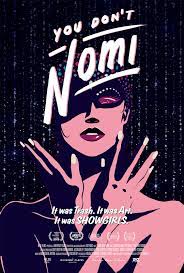
YOU DON’T NOMI
US, 2019, 92 minutes, Colour.
Directed by Jeffrey McHale.
Paul Verhoeven’s Showgirls was released in 1995, winning so many Razzies (and his turning up to accept), strongly critical reviews, often laughed at.
The film is set in Las Vegas, showgirls, strippers, clients at the casinos, a blend of the glamorous and the tawdry, especially featuring rivalry between two showgirls played by Elizabeth Berkely and Gina Gershon.
Here is a documentary, almost a Silver Jubilee celebration of the film, a re-appraisal. In the title Elizabeth Berkely’s character is called Nomi Malone. And it is emphasised that Nomi can be understood in many ways, and negative in no Me, or a demand Knowe Me, or an abrupt assertion No! ME. All relevant in this reappraisal.
Throughout the film there are many reviewers giving their opinions, from the time, and some in retrospect. And the writer-director uses the device of many chapters throughout the film, indicating that critics had different perspectives on Showgirls as a masterpiece – a cult film after all the years or a masterpiece of drek.
The film is in strong defence of the presence and performance by Elizabeth Berkely and regretting the severity of the response to her performance in the film and its effect on her potential and career. There are sequences from the television series in which she starred, Saved by the Bell, indicating why she was cast in the film. And, there are plenty of clips from the film itself as well is interviews with her over the years. And there are many scenes dramatising the clash with Crystal, played by Gina Gersho, and some interviews with Gina Gershon herself.
What may be of more interest to film buffs and this analysis of Showgirls and defence of it, especially with the bravado of Verhoeven himself at the time and decades later with interviews, is the survey of Paul Verhoeven’s career, with ample clips from many of his films, from those in Holland including The Fourth Man and Spetters, to the range of his Hollywood films including Flesh and Blood, Hollow Man, Robocop, Starship Troopers – and, of course, a lot from Basic Instinct and Sharon Stone.
This gives an opportunity for audiences to appreciate the director’s very forthright Dutch approach to his themes, treatment, sexual provocation, nudity, crass behaviour (and his including scenes of mirrors, fingernail care, vomiting from so many of his films).
Worth checking out the comments on IMDb, bloggers enjoying their comments on Showgirls:
- an over-the-top disaster that you can’t look away from…!
- This is not a documentary. It's a 90min movie review by a bunch of irrelevant "critics" spouting their irrelevant opinions no one cares about and no one asked for. They sit around pontificating the meaning behind every little thing and how the movie is full of "misogyny" and "racism". None of which is true,
- When does trash become art?
- An extended video essay about a film that bombed.
The film shows how much can be made of any film with a range of different viewpoints commenting, extensive clips to prove or disprove a point, and the question whether this kind of documentary would urge viewers to watch Showgirls – or watch it again.
We Made a Beautiful Bouquet
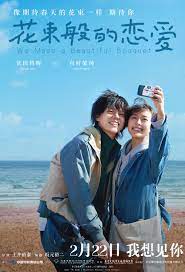
WE MADE A BEAUTIFUL BOUQUET
Japan, 2021, 124 minutes, Colour.
Masaki Suda, Kasumi Arimura.
Directed by Nobuhiro Doi.
This is a Japanese story, a Japanese romance, very much of the 21st-century, a focus on young adults, a film for a young adult audience who appreciates the contemporary references to arts, entertainment and social media.
While the film opens in 2020 with a symbolic discussion about two people sharing earphones to listen to music and the point made that each hears different aspects of the same music. As the film goes back and we follow the story of two young people who met on a chance encounter in the rain, missing the train, we realise that this is what is happening to them, bonding together but perceiving life from their particular earphone.
The film goes back to 2015, indicating the progress of the relationship year by year. The film also uses the device of showing the same episode from the point of view of each of the characters, their interpretation, inviting the audience to agree with both or, perhaps, prefer to respond to a particular perspective of one.
The performances are joyful, the characters emerging from a certain younger shyness to a great bonding, shared contemporary culture, theatre, movies, television, social media, particular authors, particular personalities.
As they grow older, the demands of life, a sense of responsibility, become very important, it is interesting how the film shows the response of each, the young woman studying, getting a responsible job, but wanting something in which can be more per personally involved. The young man, on the other hand, finding it hard to get a job after many interviews, drawn into business, becoming more and more involved, his time, interests and energies, travel, meals…
With the consequent falling apart of the relationship, he wanting to propose but his idea of marriage very traditional, not acceptable to her.
A beautiful bouquet – but only temporary.
- A Japanese story? A story of young Japanese in the 21st-century? For a young audience?
- The Japanese settings, cities, apartments, restaurants, workplaces, business, events management? Realistic settings? The musical score?
- The title, with reference to Mugi and Kinu? The time of making the bouquet? The aftermath?
- The opening, 2020, the restaurant, the couple with the earphones, sharing the earphones, the music, and the comment about each hearing a different perspective of the music because of the limit of one ear phone? This is a symbol of what happened with the couple?
- The device of going back into the past, showing the couple year by year?
- The accident of their meeting, the social, the rain, missing the train, passing the night, the next morning? Encountering each other again?
- Kinu, very young, prospects, lack of experience, family? Mugi, same age, more reclusive, attractive? The potential for a couple?
- The emphasis on contemporary media, theatre, the movies, social media, games, the details in the screenplay for younger audiences to identify with and believe?
- Their time together, getting to know each other, friends, the decision to live together, the bonding between them?
- The passing of the years, teens into their 20s, the shared interests, but the challenge to do something more?
- Kinu, her studying, achievement, accountancy, the job in the hospital, efficient, her wanting something more, the invitation to managing events, the sequences, her success?
- Mugi, being urged to take responsibility, to earn money, his range of interviews, not being employed, finally being accepted, his training, his response, with those on higher levels, the demands, his commitment to his work, the affected home, travel, meetings, meals, phone calls?
- The film’s device of the voice-overs, showing the same episodes from the point of view of each? Audience sympathies moving from one to the other? More appreciation for Kinu and her emotional experiences? Less appreciation for Mugi and his being caught up with the demands of his work?
- The consequences for the relationship, that life, the sexual relationship? The issue of marriage, Mugi and his wanting to marry, his conventional image of marriage, his job, children, Kinu at home?
- The sadness of the breaking down of the relationship, the scattering of the leaves of the bouquet, each of them finding a new partner, and the rueful encounters and memories of the past?
Albert Brooks Defending My Life
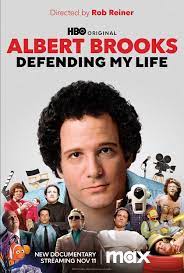
ALBERT BROOKS: DEFENDING MY LIFE
US, 2022, 88 minutes, Colour.
Albert Brooks, Rob Reiner, Judd Apatow, James L. Brooks, Larry David, Jonah Hill, Conan O'Brien, Chris Rock, Sarah Silverman, Steven Spielberg, Ben Stiller, Sharon Stone, Wanda Sykes.
Directed by Rob Reiner.
Albert Brooks has had a long career as a comic, stand-up comic, performer, film star, director. His life started with some irony because his family name was Einstein and his parents, his mother singer and dancer in the movies and on stage, and his father, Harry, a very popular comedian in film, radio and television, Parkyakarkus, decided to call their youngest child Albert, Albert Einstein. (To avoid any mixup, young Albert became Albert Brooks!).
For a great deal of the film and its complete framework, Albert Brooks sits in a restaurant with his boyhood friend and school companion, writer-director-actor, Rob Reiner, who directs this film and many clips of each man’s parents. They enjoy their conversation and their reminiscences, and so do we. (Except for an angry blogger who felt that this was all too chummy and not critical enough!)
In just under 90 minutes, through the conversation and through clips, we have Albert Brooks’s personal life, the stages of his career, his achievement, his marriage and family – with some testimonies from his wife and his two children. And, there are a great number of admirers as indicated in the list of contributors above. Not only are they in admiration of Brooks but they will remember and describe their first memories of his comedy and many of them indicating that it spurred them in their own careers – and this ranging from Larry David and Conan O’Brien to Jonah Hill, Chris Rock, Sarah Silverman, Ben Stiller too great admiration from Steven Spielberg.
And, for movie buffs, all of his films are given the context, their initial impact, especially Real Life and Modern Romance, to his entertainments like Lost in America, his starring with Meryl Streep in Defending Your Life, inviting Sharon Stone to star with him in The Muse. Rob Reiner asks Brooks about his relationship with his mother and there are many scenes of Brooks’s film, Mother, Debbie Reynolds embodying on screen his actual mother.
And, it is surprising to find how many films Albert Brooks appeared in as an actor, starting with the role in Scorsese’s Taxi Driver in 1976, an Oscar nomination for Broadcast News, and clips from a very interesting career range of performances. And his children reflecting on his voicing the father in Finding Nemo.
So, in a way, this is an entertaining way to spend 90 minutes. For those who know very little about Albert Brooks, anti-opener. For those familiar with him, very entertaining and interesting.
Moving On/ 2022
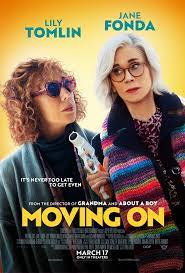
MOVING ON
US, 2022, 85 minutes, Colour.
Jane Fonda, Lily Tomlin, Malcolm McDowell, Richard Roundtree, Sarah Burns.
Directed by Paul Weitz.
From 2015 to 2022, Jane Fonda and Lily Tomlin appeared in the television comedy series, Grace and Frankie. They also teamed up for this film as well as 80 for Brady.
Audiences will enjoy seeing the two leading ladies in their early to mid-80s, still commanding the screen. And, so often villainous, Malcolm McDowell at age 80. And veteran actor (Shaft) Richard Rountree. The film is been directed by Paul Weitz, writer and director of a range of American comedies starting with American Pie.
The situation is a funeral, Jane Fonda’s Claire coming from Ohio for the funeral of a friend, encountering another friend from the past, Evelyn, played by Lily Tomlin. The target is Malcolm McDowell, Howard, the husband of the dead woman, but Claire wanting revenge for his sexual assault on her from the past. She intends to kill him.
On the one hand, this is a comedy drama in the Me#Too era, a challenge to men who have concealed their assaults. On the other hand it is a comedy drama of mishaps, Claire’s attempt to buy a gun, Evelyn getting a gun from another resident of the Aged Care facility (in exchange for crisp bacon), the gun turning out to be a flare…
And, unexpectedly, Richard Roundtree turns up as former husband of Claire, now with his own family and grandchildren, rekindling past love.
While Claire does her best in her attempts to kill Howard, she is saved by his having a heart attack!
Slight, serious in its current exposure of male sexual assault in the past, and a reminder that strong performers can continue for as long as they can.
- The title, getting older, but also taking in hand consequences for past life?
- The situation, the funeral of a friend, old friends gathering, grief, past hurts, and the intention to kill?
- The California setting, homes and grounds, apartments, aged care? The musical score?
- The focus on Claire, Jane Fonda in her mid-80s, strong screen presence, travelling from Ohio, at home, her daughter, taking care of the dog, her surly grandson? The flight? Going to the funeral, the confrontation with Howard, his manner, her confrontation? Meeting Evelyn, memories of the past, their times together? The friendship with the dead woman? The complication of relationships? Claire and the confrontation with Howard’s daughter, later getting Evelyn’s correspondence, and the acknowledgement of the truth?
- Evelyn, Lily Tomlin in her mid-80s, capitalising on her screen presence, the past, acerbic, the cello, unable to play well, the pretense of an apartment, living in aged care, her care for the little boy, encouraging his cross dressing, her clash with the boy’s parents, urging him to be true to himself? The lesbian character, telling Claire about her relationship? Her going to the funeral, her speech, after gatecrashing, the declaration about her sexual relationship with the dead woman? The effect on Howard, on his daughter, on the congregation?
- Claire and Evelyn trying to buy a gun, not able to in California because she was from Ohio, at the reception, getting the knife from the kitchen, having to give it back? Still intent on killing Howard? The final revelation of the events of the past, Howard and his callous description of what happened, blaming Claire, the effect on clear for her life? Wanting Howard to admit the truth?
- Evelyn, the aged care patient, his love for bacon, the gun, Claire cooking the bacon, in exchange for the gun, getting the orderly to get the box from the cupboard? The revelation that it was a flare?
- Claire meeting Ralph, the revelation of the past marriage, separation, reasons? Ralph and his second marriage, his family, supportive? Claire meeting them? The invitation to stay the night, the effect on each of them?
- The attempted killing Howard, Evelyn distracting from the attempt, Claire using the flare as a signal, Claire and her confrontation with Howard, his having a heart attack, the collapse, the hospital, the visit, making peace with Howard’s daughter?
- Evelyn’s advice about not going to prison, and the satisfaction of Howard’s collapse?
- The touches of black comedy, and the veteran cast?
Honey/Miele
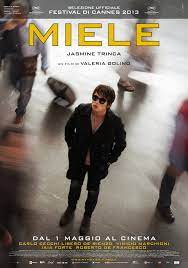
HONEY/MIELE
Italy, 2013, 96 minutes, Colour.
Jasmine Trinka, Carlo Cecchi.
Directed by Valeria Golino.
Honey is the codename for a woman whose work is to assist with suicides. Her actual name is Irene and she is played by Jasmine Trinka. The film has been directed by long-time actress in Italian films as well is American films, Valeria Golino.
For most audiences, the theme of the film will be to response. It is a question of assisted suicide, moral issues, ethical issues, legal issues, psychological issues – for the person wanting to die, for relatives and friends, and, as in the case for Irene, the effect on the person assisting.
The film has an Italian setting, an atmosphere of Italian cities, sense of realism. And, monthly, Irene travels to Mexico to buy the drugs for the assisted suicide procedure.
Irene does have some life, visits with her father, a woman friend, sexual liaison with associates. And she has a contact who gives her the names of potential clients. She visits them at home, explains the situation (also for the audience), notes that they can withdraw at any time. There are several examples of the procedure, the focus on those dying, the focus on those associated, and the camera watching Irene during the process, some compassion, concern.
Ultimately, this gets too much for her, complicated by her association with an older man, Carlo Cecchi, who asks her help, questions her in detail, but does not want an assisted suicide. There is clash, Irene wanting to retrieve the drugs, her returning to his apartment, the conversations, breaking down of barriers, conversations, and a friendship.
This all has an effect on Irene who then wants to withdraw from her work assisting suicides.
With the performances of the central actors, this becomes more than just a film treatise on assisted suicide but helps the audience to appreciate the emotional and psychological demands.
- The theme of assisted suicide? Moral issues? Legal issues? Psychological issues? For those dying, for family, for those assisting? Compassion? Business?
- An Italian setting, the city, apartments, streets, cafes, atmosphere? The visits to Mexico? The settings for the assisted suicide? The musical score?
- The title, the codename for Irene? A sweet-sounding name?
- Irene herself, her relationship with her father, her studies, her contacts for clients, the travels to Mexico for the drugs, drugs for putting down animals? Three years assisting in suicide? The contact and the discussions, her buying the drugs, the procedure, her explanations, giving the clients the option to pull out at any time?
- The settings for the suicide, the man with his wife, sitting up, the music? The young man, the vodka, the open window, Irene not staying to the end?
- Carlo Grimaldi, the contact, his age, attitudes towards life, divorce, the discussions with Irene, her reaction? His detailed questions, autopsies…? His not wanting to kill himself? Her bringing him the drugs, her returning to try to find them? The discussions, her return, the phone calls, her concern, the breaking down of the barriers, the outings, the meal at the restaurant, his visit to her house? The friendship? The importance of swimming for Irene?
- Irene and her personal relationships, the men in her life, their relationships? Her friend and her questioning?
- The effect on Irene, her wanting out of her work, the discussions with contact? At home, Carlo’s visit, appreciating the sea? Her going to his house, his previous comment about throwing himself out of his apartment, five floors up?
- The human and humane portrait, Irene’s questions, the questions for the audience?
Winners/ UK, Iran
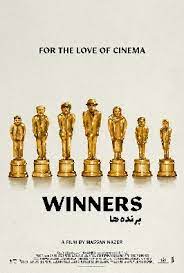
WINNERS
UK, 2022, 85 minutes, Colour.
Reza Naji, Parsa Maghami, Hossein Abedini, Helia Mohammadkhani.
Directed by Hassan Nazer.
The cinema industry in Iran has, for decades, been outstanding, a succession of world-renowned directors, writers, producers, performers, presence at many festivals, many awards. This is the background to this entertaining film, made by Iranian-Scottish writer-director, our son knows there. He is from Aberdeen but has written this story about life in the run, a country village, bringing it to life, its Post Office, homes and television, school, children and the rubbish heap’s for collecting and selling plastic, all with the background of Uranian cinema.
This film could be called Oscar, or the Adventures of Oscar – that is, the Academy Award winning statuette, the statue awarded to Asgard variety for The Salesman, the best Foreign Language Film, 2017, and the director not going to Hollywood because of Donald Trump’s banning of travellers from Iran. Here it is being brought home by an assistant who inadvertently leaves it in the taxi, the taxi driver upset, taking it to a country Post Office, an assistant of 28 years borrowing it for photos and losing it in the desert, its being found by a young boy – and many unexpected consequences.
Many Iranian films focus on stories of children and this is very much in this vein, the excellent presence of the boy, Passer mug Army, poor, his mother rousing on him for his television and film watching, very knowledgeable about films, eager to see Cinema Paradiso, DVD supplied by his friend at the rubbish heap. In charge of the rubbish heap is an elderly man who turns out to be an actor (with the actor himself assuming a character but with reference to his winning the Silver Bear in Berlin, 2008, four colour.
The film has the light touch, some serious themes about actors, becoming victims of celebrity, wanting to retire, themes of children, school bullying, themes of poverty in the Uranian countryside.
The thought occurs that if a British version of the screenplay had been available in the 1950s, it would have been the making of a wonderful Ealing Studios comedy.
- The writer-director, Iranians Scottish, British sensibilities, Iranian sensibilities, the combination, an Iranian story, filmed in Iran?
- The scenes in Tehran, traffic, taxis, police? The contrast with the countryside, rocks, mountains, desert, ruins, the village, the rubbish heap, the post office, homes and television? Atmosphere, musical score?
- The title, the Academy Awards, the film dedicated to Abbas Kierostami, Jafar Panahi, Majid Majidi, Asghar Farhadi? References to their films?
- Iranians, love of cinema, their own cinema and its traditions, great names, influences? But love of international and American cinema? The posters? The references? And Cinema Paradiso?
- The introduction to the theme, the taxi, the box with the Oscar, the woman getting out, leaving the package, the police moving the driver on? His concern, taking it to the post office, the postmistress and her recognising it, the plans for returning it? The assistant, 28 years, taking it, wrapping it, wanting to show his family, photos? Writing on his bike, the wedding ceremony, colourful, the truck breaking down, is having to take the desert route, losing the statue, his concern, returning, the police, the postmistress?
- The introduction to Yahyah, at home, watching the movies, his mother’s concern, not sympathetic to the movies? The boy, his age, knowledge of films, borrowing them from Sabre, Cinema Paradiso? At school, his friendship with Leila, the big boys and the bullying, fights? The children gathering, the rubbish truck, the garbage heap, the bags of plastic, the weights, Nasser Khan, in charge, the dwarf helping him, Sabre helping? The weights, the payments?
- Nasser Khan and his background, upset, the Oscar statuette, taking Yahyah aside, his keeping silence? The discussion with Sabre? The silver bear from Berlin? Treasuring it? His story about the pressure of acting, in the public eye, wanting to escape? Yet missing it, deciding to return, with his Silver Bear? He and sabre moving out? The drive to Teheran?
- Yahyah, finding the statue, trying to sell it, the dealer, Leila wanting the doll, the dress for the statue and its modesty? The clashes with the children? Yahyah at home, the discovery of seeing Nasser Khan as an actor? Sworn to silence? Upset, throwing the statue away, recovering it? Defying his mother? The decision to return it to its owner?
- The taxi ride, the taxi driver, echoes of Jafar pun he and his film? Discussions about film, the recognition of the Oscar statue, the conversation, Yahyah getting out? His goal?
- Nasser and Sabre, the truck breaking down, yet their decision to go on and back to film?
Dark Matter/ Iran
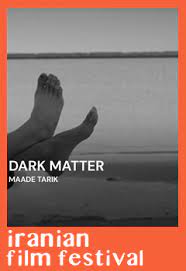
DARK MATTER
Iran, 2023, 84 minutes, Black-and-white/Colour.
Mahdis Mahdiyar, Keivan Parmar, Iman Sayyadborhani.
Directed by Karim Lakzaheh
Dark Matter is a brief film for the Festival, arthouse circuit and, especially for aspiring filmmakers. It is small budget, focused on a few central characters, and a film within a film, so to speak. It became celebrated in 2023 for its critique of the hijab, considering the controversies in Iran, the condemnation of women not wearing the hijab, the interventions of the moral police, the deaths of young women at the hands of the Morality police. Dark Matter was, excusing the pun, unveiled at the 2023 Karlovy Vary Festival.
Two acting would-bes are in the countryside, discussing auditions for small parts in the film being made, hanging around, conversations. One is an actress, defiantly not wearing the hijab, going back to her hotel, waiting for a call, invited to a party, but thinking that the other hopeful actress was going to get the part. The actor, meanwhile, hangs around, ingratiates himself in helping with moving equipment, offering himself as a driver. In collusion with the young actress, he drives her rival out into the countryside pretending that this is where the shoot is to take place and leaves her there alone. He then drives his friend – but, a change of heart, going to rescue the other actress who is very angry.
They encounter a would-be director who has an old camera. What happens is that they concoct their own screenplay, taking advantage of their own personalities, their interactions, especially with a millionaire. They make up the film as they go, filming particular scenes, meaning that the action does take the form of a small drama, the friends robbing the millionaire, his safe, finding a piece of a meteorite, making contacts to sell it, and their being one-upped by the buyer turning out to be the millionaire himself – who has a gun and shoots them.
While the general audience may be interested and amused, the situation, the characters, the desire to make a film, making up a scenario, acting it, filming it, is much more for movie students and hopefuls.
Freelance

FREELANCE
US, 2023, 108 minutes, Colour.
John Cena, Alison Brie, Juan Pablo Raba, Christian Slater, Marton Csokas, Alice Eve.
Directed by Pierre Morel.
Once upon a time, once upon a Cinema time, the used to be Saturday matinees, especially for children’s audiences. Lots of adventures, heroes, damsels in distress, serials and cliffhangers at the end of every episode…
Those days are long gone but there has been a long tradition since then of action adventures, often impossible situations, strong heroes (and, for some time now, always with guns), no longer damsels in distress – maybe the distress but strong-minded leading ladies who share in the action.
Freelance is one of these films. Some critics sadly will ask why? And audiences answer, why not!
The action heroes that we have become used to, Sylvester, Arnie…, are now in their late 70s (but still seeing themselves as Expendables). Here we have John Cena, in his 40s, big, square-jawed, champion wrestler and still commentator on WWE on film and television. He is more in the tradition of Dwayne Johnson are certainly not as charismatic.
Actually, there is quite a lot of comedy in Freelance. It may remind action movie buffs of Romancing the Stone, or more recently, The Lost City, traipsing through jungles, enemies in pursuit, and some deadpan dialogue. And, speaking of Expendables, some of the action may be considered in that vein.
And, speaking of vain, John Cena as Mason Pettiits, bored after heavy action overseas in his current work as a lawyer, persuaded to take up protecting an ambitious journalist, is not vain. But the president of the fictional Paldonia (think any Latin American country), definitely is. His played by Juan Pablo Raba who is clearly enjoying himself right throughout the film, and this is quite infectious for those who are willing as we enjoy his company – for most of the time very dapper, immaculately clean white suit, always buttoned, no matter what the crisis, no matter the weapons, no matter the danger.
Alison brie plays Claire Wellington, top journalist, award-winning, shamed when exposed is not researching her sources sufficiently, invited by the president to interview him checking with a security company (the head played by Mason’s former colleague, Sebastian, played by Christian Slater – who is eight years older than John Cena, but…). And, filming the coup, the fighting, she has the perfect television program for more awards.
So, it is that kind of film. It does have a contemporary justice moral, the reforms begun by the formally exploitative President, the influence and lobby of South African mercenaries (led by New Zealand actor, Marton Csokas, seen enjoying his little girl ballet dancing to Swan Lake and then, South African accent, becoming a snarling, menacing villain) and international companies wanting to exploit mineral resources for future technology, the battle for the poor and integrity.
Not high cinema, never intending to be, but under the direction of the French Pierre Morel (Taken, to Paris with Love, The Gunmen) it has been made for an enjoyable time off.
- A blend of action adventure with comedy? Successful?
- The settings, American military action overseas, the quiet town, home, legal office, the contrast with the big industrial company, and the Latin American country, town, government Palace, interiors, and the countryside? The musical score?
- The narration by Mason? As a boy, influences when young, ambitions, sense of self, studies, lawyer, enlisting, exhilaration in action, the loss of friends? At home, tensions, his cheeky daughter, his wife impatient? Moving out? At the office, the client and his enthusiasm, the contact from Sebastien, the offer, his taking it?
- Clare Wellington, seen on air, her reporting, the award, checking her facts, petty jobs, the invitation from the president? The need for protection? Sebastian employing Mason? The meeting, tension, the flight, his watching videos?
- The political situation, American interventions, the South African company, lobbying, precious metals and exploitation? The opposition and rebels? The president and his nephew as a figurehead for taking over?
- Juan Pablo Raba as the president, his enjoying the performance, meeting the plane, making everyone welcome, sense of self, the attack, violence and deaths, Mason rescuing them, on the run? His saving them after helicopter raid, his village, his friends, being welcomed? Casual clothes in the interview? His dapper white suit, always buttoned, never dirty, and, ultimately, bullet-proof? His acknowledgement of the past, his change of heart, working for the people?
- The introduction to the South African colonel, his daughter and Swan Lake? Going into action, his ruthlessness, his squad, mercenaries, ambitions? The pursuit of Mason and the president? Capturing Clare? Confrontations, deals and exchange? Trapping everyone in the village? The setup, the prisoner giving himself up, then all the rebels coming out in support of him, the confusion? At the palace, the invasion, the fights, the secret tunnels, the bullet-proof suit? The death of his nephew? Clare filming everyone? His future secured after his shooting the general behind the coup?
- Mason and Claire, odd couple, like Romancing the Stone, the adventures, shooting, riding the horses, Mason and his shooting, his war wounds and bad back? Phone calls to Sebastian? The helicopter raid and the pursuit? The discussions with the president, orders to kill him, listening to him, bonding? The action in the palace, the fight with the colonel, success? Returning home, reconciliation with his wife, the daughter – and the big cheque?
- The background of Sebastian, war companion, all his company, contracts, resources, offloading the South Africans, coming to the rescue?
- The popularity of this kind of blend of comedy and action?
Jawan
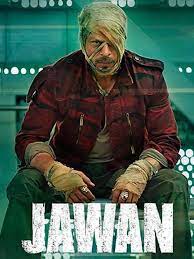
JAWAN
India, 2023, 168 minutes, Colour.
Shah Rukh Khan, Nayanthara, Vijay Sethupathi, Depika Padukone.
Directed by Attlee.
For audiences who have seen nothing or very little of Bollywood filmmaking, here is a strong opportunity, a film seen in many cinemas but then released by Netflix.
The important thing about Bollywood films is that Indians surrender to their style, colourful, often melodramatic, heightened emotions, and song and dance introduced on many occasions. If a non-Indian audience is to appreciate a Bollywood film, then they have to be willing to surrender to it, not bringing personal/national presuppositions, cultural sensibilities, because the Indian/Bollywood sensibility is very different.
India has a long tradition of visual art, statuary, religious significance, bright visual styles. And that is very evident in their films. The films require more than a very willing suspension of disbelief.
And, the film is a very long – and there is a great tradition in India of the enjoyment of Intermission.
This film opens in a traditional border village, simple life, work, statuary and religious leaders, and a military invasion which is brutal, merciless in killing women and children. However, a strange character appears, the audience having seen his body floating in the river and his rescue, who takes off his bandages, and does extraordinary battle, an Indian superhero. It looks as if we are into an excursion into Indian history or into Indian fantasyland storytelling – which was popularised worldwide in such films as rRr.
But the film moves forward 30 years (only) to 2022 and a long modern action segment, a kind of Mumbai The Taking of Pelham 123, the introduction to significant women, their all boarding a train and its being held up by a mysterious character, supported by the women, holding the passengers as hostages. This moves very fast, full of action, tension, the killing of a woman hostage, the tying up of the police officer on board, the scenes at railway control, especially the police leader.
It soon emerges that this is a social protest against the huge number of suicides of Indian farmers unable to repay loans – with dramatic flashback story sequences to illustrate this. (There is some relief when we see that this is a kind of Indian Robin Hood activity is not fully life-threatening.
We have seen the leader of the situation, played by long-time Indian popular star, Shah Rukh Khan, whom we see as warden of a prison, women’s prison – and realise that they are a team leading the social protests. And, the next episode, highly dramatic and melodramatic again, is a demonstration against corruption and politics, hospitals without equipment, trapped by bureaucratic requirements, deaths of children.
We are also introduced to a financial tycoon, key, ruthless villain with an array of tough henchman – and his visit to Russia looking for a loans and becoming indebted to the Russian Mafia.
Almost enough so far for two movies. But, the mood changes, a little girl liking the warden and trying to set him up to marry her mother. No spoiler here but it makes the rest of the film emotionally very complex!
And not to forget that there have been already several very elaborate song and dance episodes, cast of hundreds, at least.
Surprisingly, then the narrative goes back to the 1980s, full background of what it happened in the past, the mysterious stranger, the connection with the prison warden, and with the arch-villain. It all builds up to an even more spectacular climax, in the James Bond vein.
At almost 3 hours, the action doesn’t really lag, Bollywood style sweeps up its audience, taking it in so many different directions, colourful entertainment – but, in this case, with very serious critique of political and social corruption.
Look Away
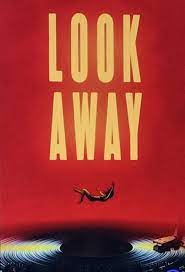
LOOK AWAY
UK, 2021, 90 minutes, Colour.
Kari Krome, Julia Holcombe, Sheila Kennedy, Jackie Fuchs.
Directed by Sophie Cunningham, Ben Steele.
This is a very disturbing documentary. It is very much a result of the Me Too# movement and revelations, subsequent court cases and imprisonment of offenders.
The particular focus here is the music industry. And, even more specifically, the American music industry of the 1970s. The title of the film comes from Iggy Pop’s song of the same name and his having had a sexual liaison with a 13-year-old.
The film uses quite a number of interviews, lengthy interviews, an opportunity for abused women to speak, to be heard, to be seen. The perpetrators are seen in archival footage. And, there are quite a number of commentators, journalists, women involved in the music business, reflecting on the period, critical of what went on, confirming the interviews of the abused women.
A lot of attention is given to Julia Holcombe, a rather wild 15-year-old who became infatuated with Steven Tyler of Aerowsmith, was introduced, they bonded, a relationship and her touring with him, his wanting to make her his ward and adopt her, which happened. Julia is very frank and plain in her telling of the story.
Kari Krome, songwriter, seen in 70s footage, is very frank in her comments about behaviour, and especially in relation to Rodney Bingenmaier, proprietor of popular LA club, English Disco, where he fostered an atmosphere of freedom, enabling this kind of sexual behaviour, unlimited.
Sheila Kennedy, a Penthouse model, offers a certain graphic description of abusive behaviour by Guns ‘n Roses lead singer, Axl Rose.
The young bassist for the girls’ group, The Runaways, Jackie Fuchs, gives quite a horrendous account of the manager, Kim Fowley, and her being subjected, drugged, to gross abuse. After leaving The Runaways, Jackie Fuchs became a lawyer and tells her story, after almost half a century, with conviction.
In only 90 minutes, this documentary, frank, frightening, direct, makes quite an impact and invites a great deal of reassessment of culture in the music industry, especially in the 1970s, the status of the rock stars and their personal and private behaviour, no holds barred, no limits. To be judged in the light of 21st-century new awareness.
According to Sophie Cunningham, the purpose of the film "is not necessarily about seeking justice in the legal sense, but having a voice – and trying to instigate change. Although we are focusing on a certain era in this film, the music industry is still functioning in a very, very similar way.
Through the lens of 2021, laid out in black and white, it all seems pretty shocking. But perhaps more shocking is that for years, this kind of behaviour wasn't at all shocking.
"I think a lot of the times the artists themselves have written about their escapades with their girlfriends or what they got up to during this era and you never really hear from the women," says Cunningham.
"Musicians were these godlike creatures, especially at that time. There were power structures that enabled them; as long as they were selling records and as long as they were making money for the big record companies, I think there was a general understanding [they] could pretty much get away with anything and also it could all just be written up as an excess of the time.
"It's very, very easy to think 'It was different then, it was hedonistic, the world was a different place'. But I think it's clear from the women who've spoken out that their experiences as [teenage] girls impacted them in the same way that they would if it happened to [teenagers] now. It's not a different era, it's just that we look at it differently."